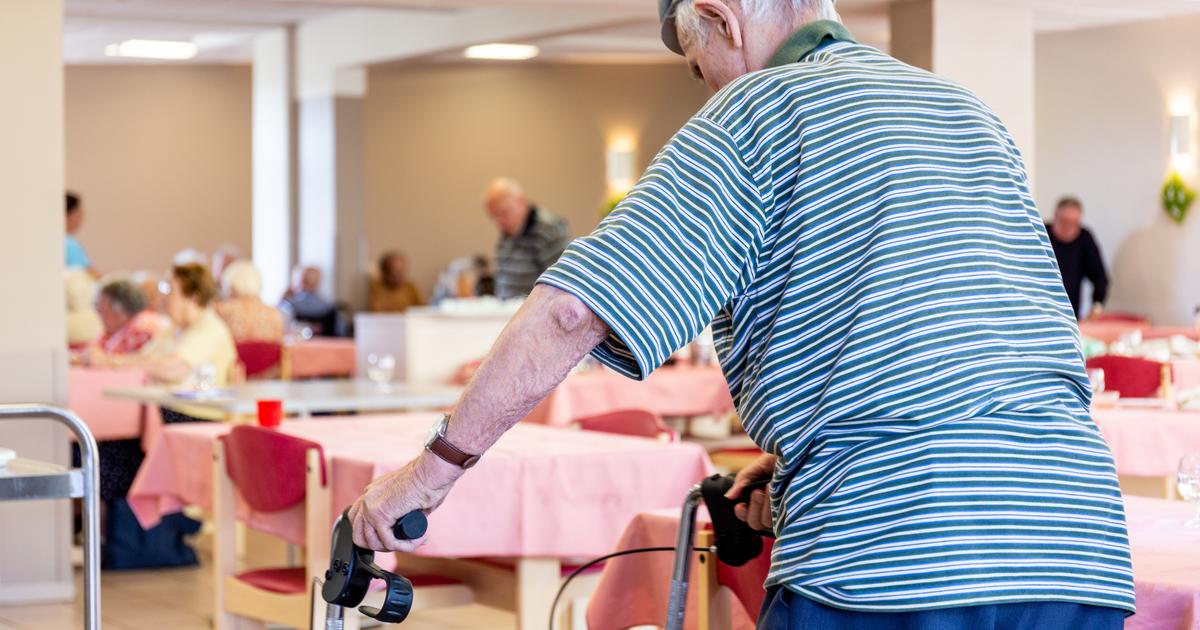There is insufficient information about the quality of nursing homes
Created: 01/13/2022, 01:02 PM
A nurse helps a woman move in outpatient care.
© Sebastian Gollnow / dpa / symbol image
According to the Bertelsmann Stiftung, important information about nursing homes is only available to consumers in six federal states.
Those looking for a facility are often denied central facts.
Patient advocates also see the Federal Minister of Health as having an obligation.
Gütersloh - According to a study, the majority of the federal states do not provide consumers with any information about the quality of nursing homes. Important information such as the deployment of personnel is available in all countries, but remains under lock and key in most of the federal states, criticized the Bertelsmann Foundation when the “White List” was presented on Thursday. Many people who are looking for a nursing home are deprived of information on essential selection criteria. "The nursing home as the most dangerous place for very old people in the Corona crisis remains a black box," said the board of the German Patient Protection Foundation, Eugen Brysch, of the German Press Agency.
In ten countries, data resulting from audits by the supervisory authorities responsible under national law are not published at all, according to the study.
Consumers therefore do not find out whether there is a lack of staff in a home or whether there are serious deficiencies, as the foundation complained about.
It is also difficult to understand which institutions are particularly well positioned.
Only North Rhine-Westphalia, Hamburg, Mecklenburg-Western Pomerania and Berlin actively published the results so that they are generally available.
In Baden-Württemberg and Hesse, the test results would at least have to be published by the nursing homes themselves.
However, the data can currently only be viewed directly in the facilities, i.e. only accessible to a limited extent.
The lack of transparency arises either because there is no state regulation with a publication obligation or because existing laws are not implemented. In Lower Saxony, Rhineland-Palatinate, Saarland, Saxony and Thuringia, publication of the test results is not provided for by law. And the states of Bavaria, Brandenburg, Bremen, Saxony-Anhalt and Schleswig-Holstein do not implement existing laws for various reasons, which is "particularly serious", it said in Gütersloh.
Hamburg stands out positively, where detailed information about temporary admission stops or results from relatives' surveys are posted online.
The most populous federal state of North Rhine-Westphalia is one of the four states in which the results of home examinations are published in such a way that they can also be accessed independently of visiting a facility.
more on the subject
Protection for property owners from late claims for money
Montgomery: Missing numbers on Corona "more than embarrassing"
Race for security vulnerabilities in server software
Choosing a nursing home means a life decision and those affected are dependent on reliable information, emphasized foundation board member Brigitte Mohn.
It can also be used to make the good work of many nursing staff publicly visible.
"Conversely, it should also be possible and permitted to identify the nursing homes where deficits exist."
Patient advocate Brysch said hygiene controls by the health authorities had been shut down due to the pandemic.
For almost two years, visits to relatives have only been controlled and made possible “in homeopathic doses”.
Federal Minister of Health Karl Lauterbach (CDU) is also asked.
He now has to explain "when the information gaps in inpatient care for the elderly will be closed."
Foundation expert Johannes Strotbek explained that people in need of care have "in principle the right to freely choose the professionally suitable, individually fitting and high-quality service provider". This requires an overview of the range of services and the quality of the providers. At the federal level, core results from quality tests have been available for several years via the “Pflege-TüV” - with gaps.
At the state level, there is a patchwork of large information deficits.
All federal states should also disclose the relevant data that are available to the supervisory authorities, Strotbek warned in the analysis.
This could also provide impetus for a quality competition among the institutions.
There is a need for specific legal requirements everywhere, which must then also be implemented.
Consumers, information portals, advice centers and health services research should be able to freely access information on care quality.
At the same time, the foundation pointed out that the pandemic in all federal states had interrupted the on-site operations of the supervisory authorities for months, which is why there were data gaps.
dpa









